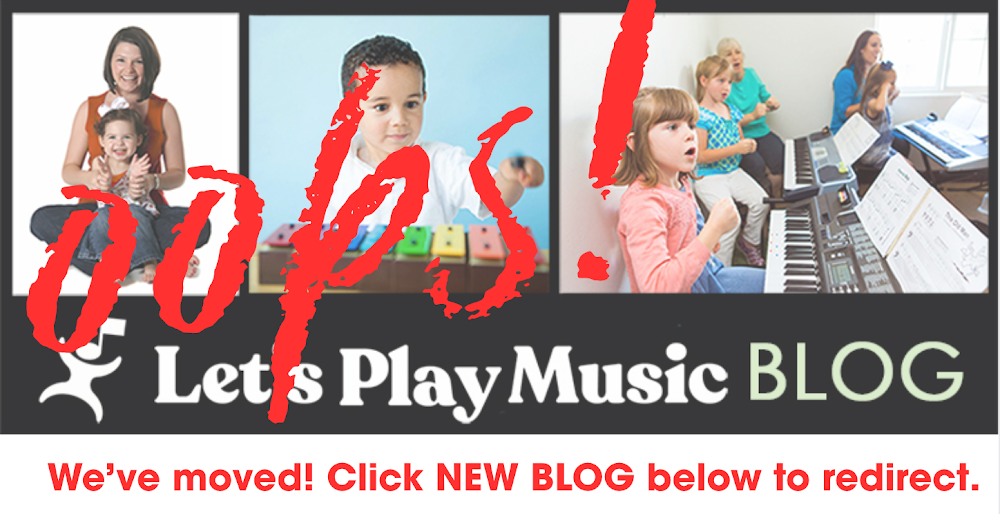You definitely benefit from music learning RIGHT NOW and I'll tell you why...
Because of Neural Development
I'm sure you've heard, when discussing learning foreign languages, that it's harder to learn a foreign language in adulthood if you were never exposed to it as a child. This is especially true if it's a language that involves utterances that are very different from those in your native language.
It's not exactly your ear, but your brain, that is sensitive. A baby hears millions of sounds and needs help knowing which ones are important. Which ones have meaning? Which ones are unimportant and should be ignored? Over time, the sounds your baby ignores become harder for her to notice at all!
When we guide a child to focus on musical sounds, by filling the environment with them, by singing them, and by rejoicing when she sings them, the neurons for hearing those patterns are strengthened. It's never too early to begin this process... in utero is not too early!
A young (or not-so-young) person who has not strengthened the neural pathways has a more challenging path, and much more work to do to retrain her brain to start noticing sounds. Because it can be done, I never tell anyone to give up on music. You're never too old.
Because the Memory Bank is Empty
Continue to consider music as a language. Two types of memory are used in learning: procedural memory and declarative memory.
We use the procedural memory system, which develops early in life, to learn complex things like grammar and musical patterns. Much of the time, procedural learning happens unconsciously. The declarative memory is used to learn things like vocabulary words and facts, and takes longer to develop.
As we age, we have more declarative memory accumulated. Adults trying to learn a new language (or music) draw from declarative memory, trying to piece together the 'facts' about how it all works. This tendency can actually hinder our ability to internalize the procedural learning. We make learning harder by thinking about it too factually!
Youngsters have it easier; they don't have a memory bank full of facts, so they play with and experiment with the music, and with guidance internalize how it works in a procedural way. (We value play!) Youngsters who start early could speak music in a native tongue!
Because Musicians Trump Pianists
Lots of children will study to play an instrument. A few will actually be musicians using their instrument as an outlet for their art. In our post, Are Music Lessons Holding Me Back?, I warned that disappointments can come from studying an instrument but ignoring overall musicianship: executive skills, notation skills, rhythmic skills, tonal skills and creatives skills.
Right now, your child is small, so I agree it doesn't make sense for him to be playing trombone or piano or violin. But, if he has no musical training for 8 years, and then jumps into trombone lessons, he runs a risk of become a trombone player but never a musician. Many (most?) private music lessons focus on executive and notation skills only. Before venturing into those lessons, spend preparatory time on rhythmic, creative, and ear-training tonal skills during preschool years.
The foundation you lay now can make a big impact on the type of musician your child becomes.
Because You Are The Student, Parent!
I'm sure you're interested in teaching 'school readiness' skills to your child at home, and I hope now you're also seeing the value in teaching 'music readiness' too. Can you do it on your own? Probably! Especially if you are musical yourself. You can do things like:
* Provide a home with lots of music playing
* Sing together often, and encourage your child to sing
* Clap, stomp, dance to rhythmic music
* Listen to different styles of music, encourage your child to listen carefully and notice/appreciate instruments, mood, tempo, themes in different songs
* Buy or make simple instruments and sing/play often
And because I want you to be a rockstar music-readiness parent (figuratively and literally), I encourage you to get your child into Sound Beginnings or Let's Play Music classes NOW instead of later. Because you will come to class with your child, you will be a student too!
In class, you will:
* Learn a plethora of new games and activities to play at home to create the ideal musical environment
* Meet other like-minded friends to play with
* Bond with your child in a focused playtime together
* Learn music theory and musicianship that's new to YOU, too!
Because We Know She's Young
One word of caution: Now that you've read about the importance of having music in her life now, you may be excited to get her into instrument lessons right away. Instrument lessons are not the same as musicianship classes.
I generally never encourage anyone to go directly into instrument lessons at a very young age. Sitting on a piano bench for 30 minutes is torture for many 4-year-olds. Even if they don't mind the stillness and focus, I worry that the musicianship skills will be unbalanced in the long run.
Instead, find a program like Sound Beginnings or Let's Play Music that is play-based, with lots of movement and fun. Children and parents will have the most success and learn the most when they are happy and feel loved. Nothing is more powerful than a first music experience that results in happy, uplifting memories couched in success, and the opposite is a first music experience that is scary or frustrating.
Let's Play Music addresses limitations and development of young players (our keyboard method), so she'll experience success and find room to push herself, too. This is a program designed just for her, at her age.
If you're ready to jump in, find a teacher near you now. See you in class soon!
- Gina Weibel, M.S.
Let's Play Music Teacher






No comments:
Post a Comment